|   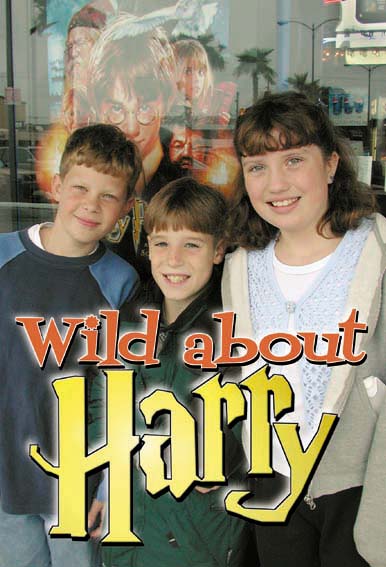
by BOB DORAN
by BOB DORAN
MILLIONS OF READERS OF ALL AGES have fallen under the spell of boy wizard Harry Potter, the hero of a series of books by J.K. Rowling, a former welfare mom who lives in England. When the fourth Potter volume came out last summer, it topped the New York Times best-seller list while the other three were still in the top five.
It's only natural that the expectations are high now that Harry's adventures have been translated into a $125 million movie. And the expectations may be highest among those in Pottermania's key demographic -- children 10-15 years old. 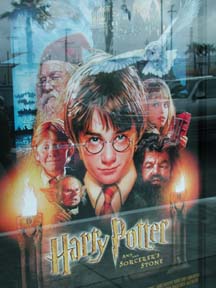 How is the movie being received by Humboldt County audiences? First, we asked Charlie Myers, a theater arts professor at Humboldt State University who teaches film and claims to see every single movie that ever comes to Humboldt County, to review Harry Potter and the Sorcerer's Stone . [See separate story.] In addition, the Journal invited three budding critics from Potter's target audience to last Friday's premiere to hear what they had to say. How is the movie being received by Humboldt County audiences? First, we asked Charlie Myers, a theater arts professor at Humboldt State University who teaches film and claims to see every single movie that ever comes to Humboldt County, to review Harry Potter and the Sorcerer's Stone . [See separate story.] In addition, the Journal invited three budding critics from Potter's target audience to last Friday's premiere to hear what they had to say.
Skylar Adams, Kit Peterson and Megan Walsh have a few things in common. All three are 10 years old and fifth-graders at Morris School in McKinleyville. All three have read every Potter novel at least twice, some as many as five times. And all are wild about Harry.
Although professional critics are giving the film mixed reviews, the Morris School team gave the movie a unanimous thumbs up. "I really liked it," Kit said. Skylar said he would gladly "pay $40 to see again." Megan agreed, but was a tad more reserved in her praise. "I think it was almost as good as the book," she said. Since the trio of reviewers knows the Potter storyline and characters inside out, when we gathered upstairs at the Broadway Cinema in Eureka immediately after the first showing Friday morning the No. 1 topic was how the movie matched up with the book. Deviation from the text was the first thing on Megan's mind, in particular the omission of a scene near the end where Harry's friend Hermione helps with an important obstacle. "They didn't have the potion part where Hermione figures out what potion to drink and she drinks the one that lets her go back and Harry drinks the other one," she explained. "They changed some things that could be really important," said Kit in agreement. "Like the flying key part at the end. Harry wasn't really bleeding because of the keys. That wasn't in the book at all." In fact the script was almost slavishly true to the novel, often to a fault. It's interesting why, given Hollywood's historic tendency to disregard the original intent of authors when works are adapted for the screen. Rowling received a relatively small amount for the rights to adapt her books for the screen Brothers paid $700,000 for the first three novels -- partly because she struck a deal before Harry became an international phenomenon. But according to all reports, Rowling resisted giving up control over her characters and plot lines, and she has forged a unique relationship with the filmmakers. Director Chris Columbus met with Rowling and set her mind at ease by telling her his intent was to make a movie "true to the book." And screenwriter Steve Kloves consulted her repeatedly, even regarding the shape, size and location of the scar on Harry's head. Kloves' end product is a script where the storyline, the majority of the dialogue and a myriad of mino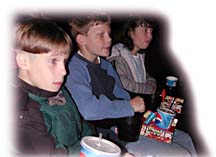 r details come straight from the book. r details come straight from the book. A film viewer who has not read the book may wonder about the inclusion of characters that seem to have no connection to the story at hand. For example, over dinner we are introduced to a ghost, Nearly Headless Nick, played by John Cleese. He pops up, explains his name all too briefly, and then disappears, never to be seen again.
At left, Skylar Adams, Kit Peterson and Megan Walsh wait for the show to begin.
"I thought they did a really good job of recreating the story," said Skylar. "They did skip a couple of parts, but then they added on some funnier parts, too." Most notably evident was director Chris Columbus' love for juvenile slapstick -- a levitating feather exploding in a student's face, an out-of-control flying broomstick smacks another in the face.
Megan had mixed feelings about the way a few things she imagined were translated into screen images. "There were some `iffies' that I wanted to know for sure. But then there were some things I had a picture in my mind that were totally different in the movie," she said.
One thing they all agreed on was the diminished importance of quidditch, a complicated sport played with four balls tiny one with wings participants astride flying broomsticks. "Quidditch was one of the main parts of the book, unlike in the movie," said Megan. She was bothered that Harry's hours of quidditch training were omitted. "He was always practicing and barely had time to do his work, but they didn't show one practice." "And we only saw one quidditch match" added Skylar. "I was a little disappointed in that." It's easy to see how preteens raised on sports like soccer might focus on this imaginary game with arcane rules that mix polo, basketball, rugby and, yes, soccer. But if you did not learn the fine points of the game from the book -- or are among those who have little interest in sports -- you may be grateful for the abbreviated quidditch match. Overall our critics thoroughly enjoyed the movie. "I thought they did a good job of creating images for me and in general they got the story down," said Syklar. "Most of the stuff we're talking about is really minor details." "If they had put in everything in the book it would be like one of those three-volume videos where you have to keep renting them night after night," he added.
At 2!/2 hours, the movie was longer than most kid flicks, but was it too long? The answer was a resounding "No." "If they had shortened it they wouldn't have been able to get as much in," said Skylar.
What about kids who have not read any Harry Potter books? Will they get as much from the movie? Skylar considers the question and decides that they might even have a small advantage. "In their mind they wouldn't be making little criticisms going, `Hmm, they left this part out or they added that.' They'd just go, `Wow, that's cool.'" "I think it will make them want to read the book," said Megan.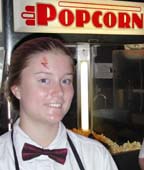 "My mom always says if you make a movie out of a book, the book is pretty much always better," said Skylar.
At right, Michelle Briggs, of Broadway Cinema, wears a Harry Potter lightning bolt scar.
"It's because you can always describe things more in a book and add more detail," said Megan. She says the amount of detail in Rowling's descriptions are what maintained her interest in the series. Kit points out a difference in the way the story is communicated. With a book, "you can put in a bookmark and the next time you pick it up, start again from the same spot. But in a movie you sit there and watch. You don't want people to get too bored with all the detail."
A ll three students said they are looking forward to future Harry Potter books and movies. Rowlings' plan is to write a book a year until Harry turns 18, along with his primary target audience. Kit said he is especially eager for the film adaptation of the fourth book in the series, Goblet of Fire. "But what they're going to have to do is make it be a couple of [movies]," said Skylar. Goblet is more than 700 pages. "They won't be able to fit all that, even in a 2!/2 hour movie. They'd have to take out so much, it wouldn't be as interesting," Skylar said. The trio won't have to wait too long for their next dose of magic. Rowling's fifth book is due out early next year. According to a story in Time magazine -- part of the media corporation that controls the Potter franchise -- screenwriter Kloves has already written the script for the second film, Chamber of Secrets, and production is already underway with Columbus at the helm. And as Kloves begins work on the third script, Columbus is already looking forward to his adaptation of the fat fourth book, Goblet, and he and Skylar are on the same page. Columbus is quoted as saying it may be a four- or five-hour movie released in two parts. If all goes as planned it could be out for Thanksgiving and Christmas in 2004.
Harry Potter and the Sorcerer's Stone Review by Charlie Myers So what is a jaded filmgoer who normally likes dark, depressing fare when he goes to the movies, doing sitting in a theater largely filled with young people watching the long anticipated film version of Harry Potter and the Sorcerer's Stone? For th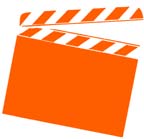 e most part thoroughly enjoying himself. e most part thoroughly enjoying himself. Having sold some 110 million copies worldwide, J. K. Rowling's books about an 11-year-old boy's introduction to wizardry at Hogwarts School of Witchcraft and Wizardry clearly have a devout following of readers of all ages. For this reason, director Chris Columbus (Home Alone, Mrs. Doubtfire) and screenwriter Steve Kloves (Wonder Boys) faced a significant challenge in adapting this novel to film. Wisely, they consulted extensively with Rowling (who resisted a number of offers to adapt her books for film before accepting that of Warner Brothers) who has given her thumbs up on this movie. For most readers, a summary of the plot of this film is entirely unnecessary. Suffice it to say that Rowling's story owes more than a little to Star Wars along with a nod to Cinderella. The pre-title sequence where Hagrid (Robbie Coltrane) and Professor McGonagall (Maggie Smith) drop a baby at the Doorstep of Destiny nicely sets the tone for the film. Parental abandonment and cruel treatment by stepparents are themes that have resonated in many books and films, most recently the rather more dark movie A.I. From this beginning, then, it is particularly satisfying to follow the subsequent adventures of Harry Potter (Daniel Radcliffe) as he is rescued from the world of Muggles and, along with friends Hermione Granger (Emma Watson) and Ron Weasley (Rupert Grint), discovers his powers, fends off evil and protects the Sorcerer's Stone from falling into the wrong hands.
Despite the emphasis on magic and wizardry, however, the center of this story is as much about the power of love, loyalty and friendship as it is about good vs. evil. Harry is able to triumph not just because of his powers but because of the bond which forms between him, Hermione and Ron. Additionally, Harry finds a new family at Hogwarts including the fatherly giant, Hagrid. Thus, at film's end as he is leaving the school to return "home," Harry tells Hermione and Ron that he is not really going home. The Philosopher's Stone (as it was called in England) may possess the power to transmute base metal into gold, but no power will ever turn Voldemort (Richard Bremmer) or Professor Quirrell (Ian Hart) into good because they totally lack a sense of love and friendship. It's not that the film lacks magical effects. Some seven or so special effects companies are listed in the end credits, including Industrial Light & Magic. But we've seen it all before and one of the nice things about the film is that the special effects do not overwhelm the story. The one place where I fully appreciated the technology was during the Quidditch match that did seem vaguely reminiscent of the race in Star Wars -- Episode I. The biggest disappointment was the appearance of Voldemort. After all of the buildup to this ultimate personification of evil, his actual appearance as a rather ordinary black-hooded figure seemed less frightening and momentous than the story led the viewer to believe. More effectively, cinematographer John Searle has captured an unusual and effective visual style, complemented nicely by the costumes of Judianna Makovsky. Particularly enjoyable was a convincing Diagon Alley where wizards both experienced and novice shop for their wands, latest model broomsticks and other necessary school accessories. A castle in Hertfordshire served as the location for Hogwarts and its gothic look created an appropriate atmosphere for a school of witchcraft and wizardry taught by a most eccentric group of professors. The constant underlying score by John Williams competently set a mood for the film and will, no doubt, be nominated for one of the many Academy Awards I expect this film to garner. But the real triumph of the film is in its casting. Wisely, Rowling insisted on casting the leads from England and the trio of Radcliffe (the young David Copperfield from the BBC production), Watson and Grint are excellent. As Harry, Radcliffe has nicely subtle reactions to the events and people around him and never seems shaken from a kind of tentative sureness about himself. Watson is a somewhat prettied up Hermione (she's described in the book as having "a bossy sort of voice, lots of bushy brown hair and rather large front teeth") but she captures the bossy, bookish qualities very well. The teeth are replaced with large round eyes. Grint as Ron is doggedly loyal and he captures to a tee the suspicion boys his age have of girls. Mention should also be made of the very fine performance by Tom Felton as the snobby, upper class student Draco Malfoy whose triumph at the end is so short-lived. It is also nice to see all of the well-known adult actors. The standout here is Robbie Coltrane in the role of the lovable giant Rubeus Hagrid. As played by Coltrane, Hagrid is a Hell's Angel who is a softy at heart and a father by default. Richard Harris, little seen recently, is also fine as Professor Dumbledore. What critics say about this film will prove to be irrelevant to audiences. Harry Potter set a single day record by taking in $31 million on its opening day and broke all box office records over the weekend. At over 2-1/2 hours and deliberatively paced, I wondered how its target audience would respond to the film. At the showing I attended, the audience was intently quiet the entire time (only a few adults came and went) and applauded at the end. I predict most people, fans or not, will respond similarly. Charlie Myers has been teaching theater and film at Humboldt State University since 1969. He sees virtually every film that comes to town.
IN THE NEWS | CALENDAR Comments? E-mail the Journal: [email protected] 
© Copyright 2001, North Coast Journal, Inc. |